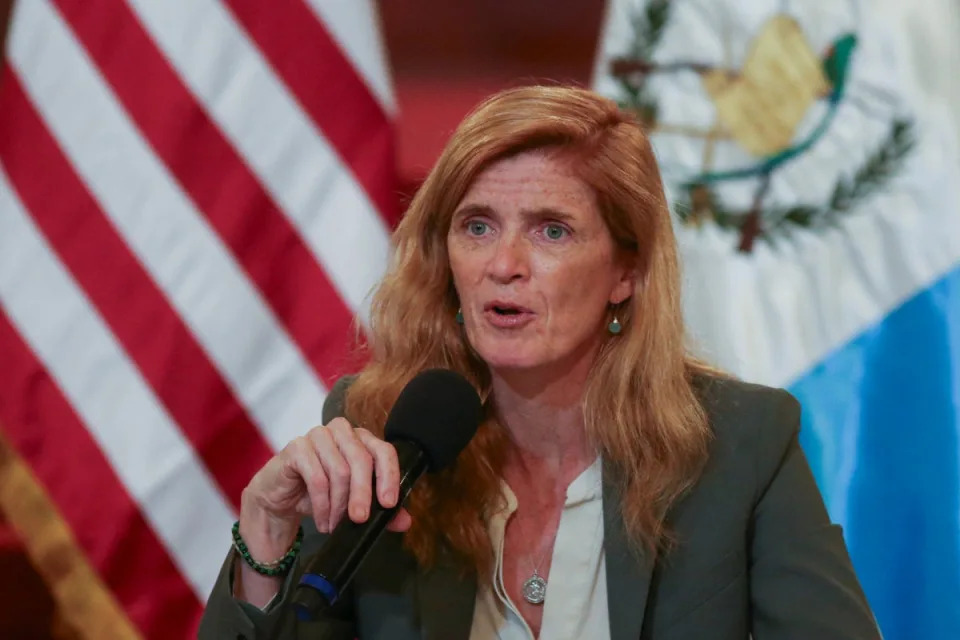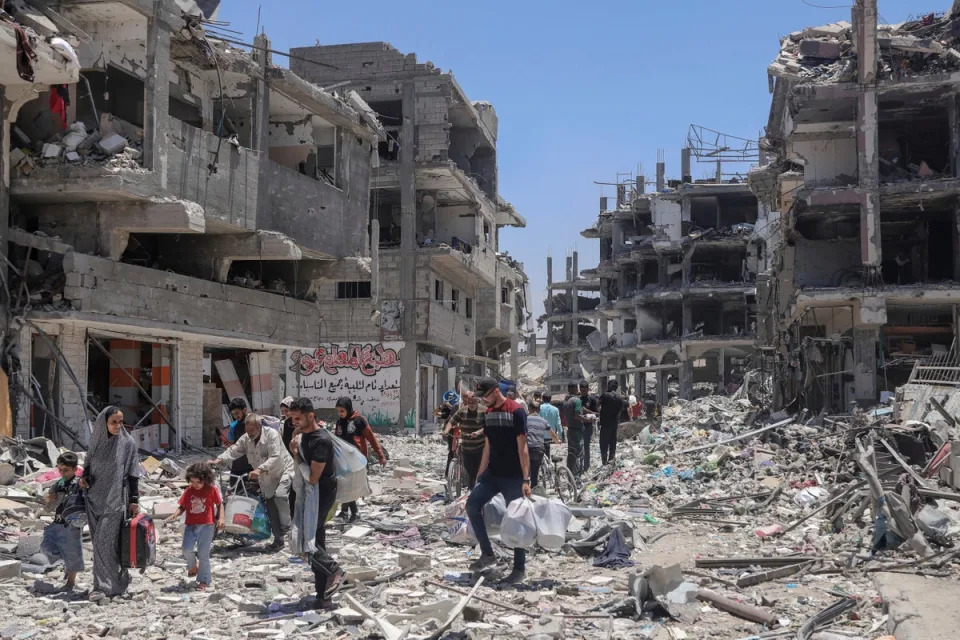Richard Hall
Mon, June 3, 2024
Alex Smith, a public health expert working in the humanitarian field, read all of Samantha Power’s books before he joined the agency she now leads. He carried around copies with him, and even hosted a book club in Rome when she released her memoir in 2019.
But this week, he delivered a blistering criticism of the woman he respected for years when he resigned from the US Agency for International Aid (USAID in protest over her failure to speak out against the same crimes she had built a career exposing.
“She has been a very passionate vocal advocate for human rights and specifically against genocide. So to see her not talk about international law now, about illegal acts that Israel is currently very publicly carrying out, it is very frustrating for me and a lot of staff,” Smith, who worked as a contractor at the agency for four years, told The Independent by phone.
Smith, who worked as a senior adviser on gender, maternal health, child health, and nutrition, became the ninth official to resign from the Biden administration over its unconditional support for Israel’s war in Gaza, and only the second to leave USAID — the agency devoted to humanitarian assistance.
He said Power’s refusal to name and blame Israel for blocking aid into Gaza, as a famine that threatens the lives of hundreds of thousands takes hold, was inconsistent with his values.
Specifically, he criticized Power for “not calling out what is causing it, and stating the very obvious fact that starvation of children is a war crime and a crime against humanity.”
But he also offered some insight into Power’s thinking and a possible explanation for why a prolific campaigner against genocide would self-censor at such a crucial time.

US Agency for International Development (USAID) Administrator Samantha Power speaks during a news conference at the National Palace of Culture in Guatemala City, Guatemala, January 15, 2024. (REUTERS/Jose Cabezas)
Smith said he believes that political pressure from the White House, as well as from Republicans like Matt Gaetz who has threatened to defund USAID for what the Florida congressman has characterized as its “radical leftist ideology”, was stopping her from speaking out publicly.
“I will give her the benefit of the doubt. Having read her books, I understand that she often takes stands that she sees as the lesser of two evils,” he said.
“In this case, she wants to preserve the budget of USAID, which is an arguable moral case that you can make, that preserving our budget does help millions of people around the world.”
However, Smith said he and his colleagues were uncomfortable about the agency censoring itself to keep the money coming in.

Palestinians walk through the destruction in the wake of an Israeli air and ground offensive in Jebaliya, northern Gaza Strip, Thursday, May 30, 2024. (Copyright 2024 The Associated Press. All rights reserved.)
“I think me and a lot of staff think that if you are preserving our budget by not telling the truth about war crimes and crimes against humanity, that’s not acceptable,” he said.
Smith’s resignation comes two weeks after The Independent published an investigation into dissent at USAID in response to the Biden administration’s handling of Gaza’s hunger crisis.
The investigation revealed that at least 19 internal dissent memos have been sent since the start of the war by staff at USAID criticizing US support for Israel’s war in Gaza.
Power herself has spoken out about the effectiveness of government officials resigning in protest.
As a young college graduate, while the Bosnian war was ongoing, she wrote in her journal: “My only regret is that I don’t work at the State Department so I can quit to protest policy. Instead, I sit impotent and incapable.”
Power began her career as a journalist covering the mass killing of Bosnian Muslims by Serbians, and became a powerful advocate for using American power to protect innocent civilians.

Palestinians gather to receive food cooked by a charity kitchen, amid shortages of aid supplies, after Israeli forces launched a ground and air operation in the eastern part of Rafah. (REUTERS)
Later, she became a foreign policy advisor for Barack Obama at a time when he stubbornly resisted pressure to use the US military to protect civilians in the Syrian civil war. She joined USAID as its administrator in 2021.
Smith said Power’s decision not to identify a culprit in Gaza’s worsening humanitarian disaster mirrored the development she wrote about in her 2019 memoir, The Education of an Idealist, in which she documented her shifting ideology from the politics of protest to a kind of brutal pragmatism.
Power has gone further than most US officials in declaring that a famine has likely already taken hold in parts of Gaza in a Senate hearing in April. In doing so, she became the first high-ranking US official to make that declaration.
Speaking to other donor governments about the crisis in Gaza on Wednesday, Power said civilians there were “paying a devastating and unacceptable price in this war, particularly in the wake of the IDF’s expanded operations in Rafah.”
A USAID spokesperson said: “We have consistently made clear, internally and externally, that far too many innocent people have been killed and injured in Israel’s war against Hamas. Hundreds of staff across the Agency are working tirelessly to accelerate aid, to advocate for greater protections for civilians and the improvement of deconfliction, and to advance diplomatic efforts.”

Israeli tanks move towards Rafah in the Gaza Strip (Middle East Images/AFP via Getty)
Cindy McCain, the US director of the UN World Food Programme, said earlier this month that there was a “full-blown famine” in Gaza’s north. Since then, Israel has launched an offensive in the city of Rafah, where more than a million displaced Palestinians were sheltering, causing the closure of a major crossing to aid and a dramatic worsening of Gaza’s hunger crisis.
Israel has vehemently denied that there is a hunger crisis in Gaza, or that it has restricted aid. It says fighting with Hamas, the militant group that triggered the current war when it killed 1,200 people and took over 250 hostages in Israel on 7 October, has hampered aid efforts. But Power’s reluctance to be forthright that Israel is a major cause of the famine has caused frustration among USAID staff, Smith said.
“There really there’s sort of a self-imposed culture of not talking about Gaza within leadership,” he said.
He added that he believes that Powers and other leaders are likely reacting to political pressure from the White House.
“No administration officials or spokespeople have stated clearly that the famine is intentional. No officials have said intentional starvation of a civilian population is a violation of international law,” Smith said. “So either administration officials at Powers’ level have been told not to state those facts or they’re choosing to self-censor, parroting the administration’s public stance.”
No comments:
Post a Comment